 Petzlover
Petzlover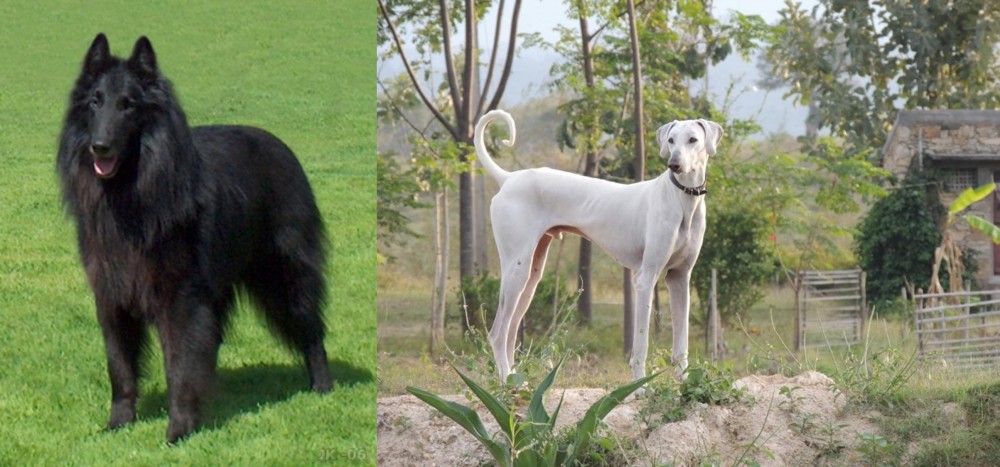 Belgian Shepherd Dog (Groenendael) is originated from Belgium but Chippiparai is originated from India. Both Belgian Shepherd Dog (Groenendael) and Chippiparai are having almost same height. Belgian Shepherd Dog (Groenendael) may weigh 10 kg / 23 pounds more than Chippiparai. Both Belgian Shepherd Dog (Groenendael) and Chippiparai has almost same life span. Belgian Shepherd Dog (Groenendael) may have more litter size than Chippiparai. Belgian Shepherd Dog (Groenendael) requires High Maintenance. But Chippiparai requires Low Maintenance
Belgian Shepherd Dog (Groenendael) is originated from Belgium but Chippiparai is originated from India. Both Belgian Shepherd Dog (Groenendael) and Chippiparai are having almost same height. Belgian Shepherd Dog (Groenendael) may weigh 10 kg / 23 pounds more than Chippiparai. Both Belgian Shepherd Dog (Groenendael) and Chippiparai has almost same life span. Belgian Shepherd Dog (Groenendael) may have more litter size than Chippiparai. Belgian Shepherd Dog (Groenendael) requires High Maintenance. But Chippiparai requires Low Maintenance
 Looking much like a pitch black German Shepherd dog, the Belgian Shepherd is a beautiful looking dog. Their roots go back to the 1800s to Groenendael, Belgium. This is where they were bred by a certain Nicolas Rose in 1910. The Groenendael is one of four different Belgian Sheepdog varieties but the Groenendael is sometimes treated as a distinct breed.
Looking much like a pitch black German Shepherd dog, the Belgian Shepherd is a beautiful looking dog. Their roots go back to the 1800s to Groenendael, Belgium. This is where they were bred by a certain Nicolas Rose in 1910. The Groenendael is one of four different Belgian Sheepdog varieties but the Groenendael is sometimes treated as a distinct breed.
They have always been used for their intelligence, serving for instance in the police force and being message carriers in war situations. Originally, Belgian Shepherds were used to herd livestock. It was in 1911 that the Groenendael was registered in the United States, and not much later the first Belgian Sheepdog Club of America formed. The breed was recognized by the American Kennel Club (AKC) in 1912.
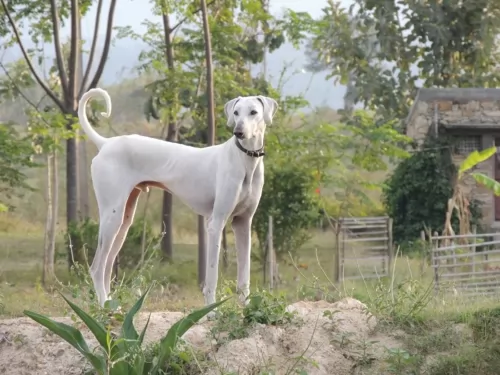 The Chippiparai is a working dog found in India and until recently there has been little interest in the purity of any breed, but rather only an emphasis on the abilities of the dog. They are only beginning to research the origin and history of their native dogs such as the Chippiparai. Not much is known about the origin of the breed except that it is found almost exclusively in Tamil Nadu and Keraia in the southern part of the subcontinent of India. Other than this there is much speculation about the breed’s origin but very little-known facts. It is indeed an ancient breed; however, its origin could be thousands of years ago or simply hundreds of years ago.
The Chippiparai is a working dog found in India and until recently there has been little interest in the purity of any breed, but rather only an emphasis on the abilities of the dog. They are only beginning to research the origin and history of their native dogs such as the Chippiparai. Not much is known about the origin of the breed except that it is found almost exclusively in Tamil Nadu and Keraia in the southern part of the subcontinent of India. Other than this there is much speculation about the breed’s origin but very little-known facts. It is indeed an ancient breed; however, its origin could be thousands of years ago or simply hundreds of years ago.
• Perhaps it is a descendant of the Saluki as it resembles this breed quite a bit. It has been believed for some time that the Saluki is the original sighthound and the source of all sighthound breeds. The Saluki was very popular in the Middle East, especially in Persia and Arabia from which it could easily have spread to India. It would then have been shared from Northern India to Southern India where the Chippiparai is found.
• Perhaps the Chippiparai is a descendent of sighthounds from Central Asia and Afghanistan – the Tazi, Taigan, Hortaya Borsaya or the Afghan Hound. This part of Central Asia had more trade, influence and contact with the Indian subcontinent early in their history than with any other region. The Chippiparai is considered by some to be more like these sighthounds than like the Saluki and the interaction between these regions has a much longer history than the Middle East and India.
• It is also speculated that the Chippiparai might have been developed completely and uniquely from the local street and working dogs. With the civilization of India being one of the oldest in the world, it is considered a possibility that the Chippiparai is the descendent of the Harappan hunting dogs that probably were developed by the Indus Valley or Harappa roiling class.
Wherever the Chippiparai came from, they were the exclusive property of the wealthy and ruling castes. These upper castes were the only ones that could legally hunt with dogs or afford to feed one. The royal classes of Tiruneivell, Thanjavur, and Madurai all fed the popularity of the breed among the upper castes. They were coursing dogs used to chase down the prey once it was sighted. The Chippiparai are incredibly fast runners and would catch almost any prey and either hold it or kill it for their hunter. The Chippiparai, when not hunting, had to be chained so they would not chase any small animal that they saw. This confinement also added to the purity of the breed as random breeding was prevented.
The southern part of the Indian subcontinent is extremely hot with routine temperatures over 100’. The Chippiparai was developed to withstand these extreme temperatures and is more heat tolerant than most any other breed. They also need very little food and are resistant to the many parasites and diseases found in southern India.
Harboring the belief that Indian dogs were not as good as European ones, the occupying countries of Portugal, France, and Britain, had no interest in the Chippiparai, again leaving the breed to develop naturally on their own with little or no interbreeding. They also received no formal recognition because Indian culture only valued the dog for its working abilities. There was no Indian Kennel Club until 1956.
The Chippiparai is now very rarely and only found in the area of its birth. Many believe the breed is in danger of becoming extinct and even though it is now registered with Indian Kennel Clubs it is not often shown in their dog shows. Lovers of the breed are now attempting to get Indians to recognize that the Chippiparai is a great companion animal and attempting to save the breed.
 With his alert, bright brown eyes, the Groenendael, referred to often as the Belgian Sheepdog, has erect ears with a long, feathered tail. The straight, strong legs are also feathered. He is well proportioned, athletic and strong. He has a dense double coat, and this working dog’s coat is black, but you sometimes find some small white markings around his paws and muzzle. The size of the Groenendael is roughly 60-66cm at the withers with the females sometimes being slightly smaller. The weight of the dog is roughly 25–30 kilograms.
With his alert, bright brown eyes, the Groenendael, referred to often as the Belgian Sheepdog, has erect ears with a long, feathered tail. The straight, strong legs are also feathered. He is well proportioned, athletic and strong. He has a dense double coat, and this working dog’s coat is black, but you sometimes find some small white markings around his paws and muzzle. The size of the Groenendael is roughly 60-66cm at the withers with the females sometimes being slightly smaller. The weight of the dog is roughly 25–30 kilograms.
The Groenendael is an active, intelligent breed and training and socializing will be necessary to ensure he knows how to behave around his human family. He is a big, social dog and won’t do well when left alone day after day in the back yard. In fact he may even show signs of separation anxiety if you leave him indefinitely. He makes for an excellent family dog, just loving their companionship and he becomes very protective of them.
He is used to making use of his intelligence and therefore he will need mental stimulation as opposed to lying around all day. He gets on well with adults, children and other pets, but he needs to grow up with children and not be put among children when he is already an adult. He is loyal and loving to his human family, forming a deep bond, especially with just one member of the family.
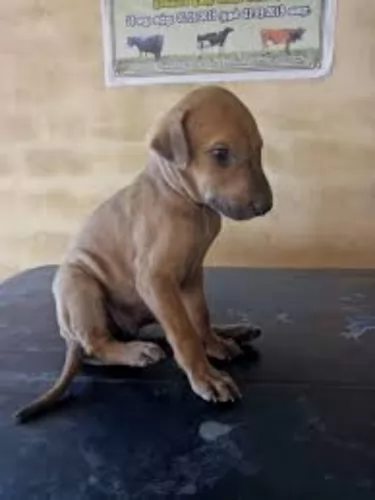 The Chippiparai is a typical sighthound although their size and appearance will vary more than that of registered purebred sighthounds. Typically, they will have a long, domed head with small erect ears and dark eyes. Their muzzle will be as deep and wide as the skull but longer. Their legs are straight and long, their chest is roached back and deep, giving them, an appearance very similar to a greyhound or other sighthound.
The Chippiparai is a typical sighthound although their size and appearance will vary more than that of registered purebred sighthounds. Typically, they will have a long, domed head with small erect ears and dark eyes. Their muzzle will be as deep and wide as the skull but longer. Their legs are straight and long, their chest is roached back and deep, giving them, an appearance very similar to a greyhound or other sighthound.
They have a long curly tail, and their coat can vary greatly in color. They are medium sized, and their coat is short, shiny and close. He is very slender and sleek, which along with his long legs gives him that incredible speed. They are thin with visible ribs.
 Your Belgian Shepherd is an intelligent, active, loyal companion for you. He is highly intelligent too, and will need the right owner who can meet his energetic needs. He therefore wouldn’t do well with in a small place where the owners are couch potatoes. He is a working dog and will require being kept busy.
Your Belgian Shepherd is an intelligent, active, loyal companion for you. He is highly intelligent too, and will need the right owner who can meet his energetic needs. He therefore wouldn’t do well with in a small place where the owners are couch potatoes. He is a working dog and will require being kept busy.
Provide him with good food, look after that thick, lustrous coat of his, provide him with a warm, dry place to sleep and plenty of exercise, love and attention and he will turn out to be the wonderful pet that makes him such a popular breed.
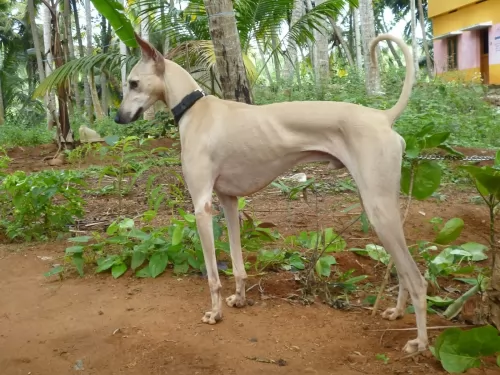 The Chippiparai is a loving, gentle family dog if well socialized, well trained and well exercised. They are very intelligent and need human companionship. Once they are living with a human family, they are very protective of that family. They are for the most part peaceful and quiet dogs. They are loyal and loving but they are not overly affectionate. Cuddlers they are not, and they do not like to play rough with children.
The Chippiparai is a loving, gentle family dog if well socialized, well trained and well exercised. They are very intelligent and need human companionship. Once they are living with a human family, they are very protective of that family. They are for the most part peaceful and quiet dogs. They are loyal and loving but they are not overly affectionate. Cuddlers they are not, and they do not like to play rough with children.
Accepting and loving within the family, the Chippiparai are equally hesitant and shy around strangers. They can be suspicious, but they are not aggressive. They are just very aloof with strangers, yet they hardly ever bark.
 The Belgian Groenendael is a healthy, strong breed with no major health problems and with an average lifespan of 12-14 years.
The Belgian Groenendael is a healthy, strong breed with no major health problems and with an average lifespan of 12-14 years.
As with every dog breed, there will be some health issues to be aware of. Skin allergies, epilepsy, eye problems and hip- and joint dysplasia are some areas to look out for
Dental disease for instance, is a common problem with pets, and your Belgian Shepherd can have serious problems with their teeth. Tartar build-up on the teeth ca take you down a trail of infections and gum disease. If you don’t want to make use of a special canine toothbrush and toothpaste, your vet will do it for you.
Your Groenendael will also be susceptible to ticks, fleas and bacterial and viral infections. As a puppy of 6 – 8 weeks, vaccinations for parvo, rabies, and distemper will be necessary. You’ll also need to be generally watching your pet’s health and to get him to the vet when he shows signs of being run-down and ill.
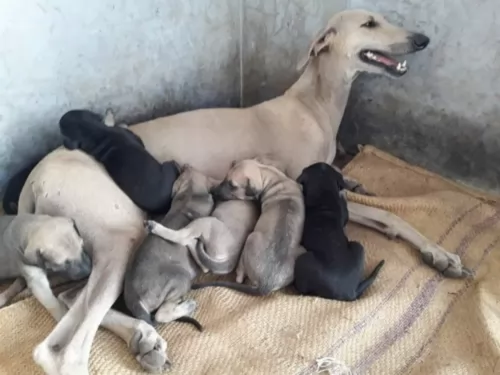 There are no clinical studies regarding the health and health history of the Chippiparai, so little is known about their long-term health. However, most who know the breed, believe it is an incredibly healthy one. They seem to have a lot less genetically transmitted health issues than other purebreds. Because of their isolation for centuries in India, they have developed immunities and resistance to most parasites and diseases other dog suffer from.
There are no clinical studies regarding the health and health history of the Chippiparai, so little is known about their long-term health. However, most who know the breed, believe it is an incredibly healthy one. They seem to have a lot less genetically transmitted health issues than other purebreds. Because of their isolation for centuries in India, they have developed immunities and resistance to most parasites and diseases other dog suffer from.
Because of this you should look for the types of issues that occur in dogs of this size and build. Have them tested by the Canine Eye Registration Foundation and the Orthopedic Foundation for Animals.
 The Groenendael has a double coat and because it is also fairly long, his black coat may well be high maintenance and brushing every 2nd day will be necessary to keep the coat unmatted and to also get rid of those loose hairs. In fact, heavy shedding is part of this breed’s life and while heavy shedding happens twice a year, light shedding continues throughout the year. Sometimes is may be necessary to send him to a dog grooming parlour to snip his hair and to wash it.
The Groenendael has a double coat and because it is also fairly long, his black coat may well be high maintenance and brushing every 2nd day will be necessary to keep the coat unmatted and to also get rid of those loose hairs. In fact, heavy shedding is part of this breed’s life and while heavy shedding happens twice a year, light shedding continues throughout the year. Sometimes is may be necessary to send him to a dog grooming parlour to snip his hair and to wash it.
A healthy, quality diet it absolutely imperative. Speak to your vet about the best kind of wet- or dry food suited to an energetic breed like this and appropriate to his age. You need to include raw meat into your pets diet every day now and then to avoid skin problems. Always ensure a bowl of clean, cool water is available, The bowl will need to be washed out every other day.
make sure his ears are cleaned. Once again you have to be careful when prodding in a dog’s ear and your veterinarian will show you how.
keep him well exercised with long walks and ball games.
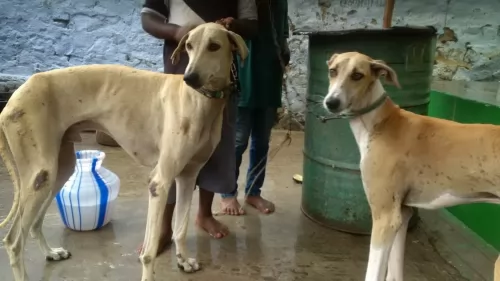 Do not overfeed your Chippiparai. Feed twice a day and no more than a total of 2.5 cups of high quality dry food.
Do not overfeed your Chippiparai. Feed twice a day and no more than a total of 2.5 cups of high quality dry food.
As mentioned previously the Chippiparai seems to have no genetic diseases or issues and very few acquired ones. However, he is sensitive to anesthesia and some foods. He is intolerant to cold weather and has a hard time with his pads on hard surfaces. Some Chippiparai might experience some of the ailments other breeds like them experience.
Both Elbow and hip are possible. This can cause arthritis and lameness. This occurs when the bone does not fit well into the joint.
This can cause lameness as well. The kneecaps slide over the knee instead of staying in place.
This is a hunting dog and he will want to hunt. They are incredibly fast and need the opportunity to run. Brisk walks will not be enough for this dog. He is very energetic. They will chase any small animals. It is not recommended that you have small pets even small dogs or cats with a Chippiparai. Having been bred for centuries to hunt, they are not likely to respond to any commands if they are off lease and chasing prey. Do not allow them to be off leash unless in a fenced area, and that fence needs to be 8 feet tall as they can easily jump a seven-foot fence. Try they at coursing, agility, fly ball and frisbee competitions.